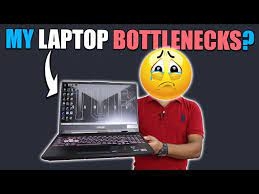Imagine you're cruising down the highway in a sleek sports car, engine purring and wind whipping through your hair. Suddenly, you hit a traffic jam. No matter how powerful your engine, you're stuck, inching forward at the pace of a snail. That, my friends, is a bottleneck. And guess what? Even the flashiest laptops aren't immune to these performance roadblocks.
Why Choose Laptops?
Laptops might be smaller than desktops, but they pack a serious punch these days. Whether you're a creative powerhouse juggling Photoshop and video editing, a hardcore gamer blasting through the latest AAA titles or a casual surfer flitting between Netflix and spreadsheets, there's a laptop out there for you. But with so many components crammed into that compact frame, the potential for bottlenecks lurks around every corner.
Types of Bottlenecks
Think of a bottleneck as a weak link in the chain, slowing down the entire system. In laptops, the culprits can be diverse:
CPU vs. GPU: The central processing unit (CPU) crunches numbers, while the graphics processing unit (GPU) handles visuals. An imbalance between these two can have major consequences. A weak CPU paired with a powerful GPU leads to choppy graphics, while a muscular CPU paired with a puny GPU might struggle with demanding tasks like video editing.
RAM: Think of RAM as your short-term memory. The more you have, the more tasks your laptop can juggle smoothly. Running low on RAM can lead to sluggishness, frequent freezes, and even crashes.
Storage: Hard disk drives (HDDs) are slow, while solid-state drives (SSDs) are blazing fast. Having an HDD as your primary storage can create a major bottleneck, impacting everything from boot times to software loading.
Benefits of Identifying Bottlenecks
Before you whip out your credit card for a shiny new upgrade, understanding your laptop's bottlenecks can save you time and money. By pinpointing the weak link, you can:
Prioritize upgrades: Instead of a shotgun approach, you can target the specific component holding you back, maximizing your upgrade budget.
Boost performance: A well-balanced system runs smoother, faster, and more efficiently, making your digital life a breeze.
Save money: You won't waste money on unnecessary upgrades that won't address the true performance bottleneck.
Steps to Diagnose Bottlenecks
So, how do you unlock the detective within and crack the case of your laptop's slowdown? Here are some handy steps:
Symptoms first: Notice sluggishness, lagging software, frequent crashes, or overheating? Identify the specific issues you're facing.
Task Manager Peek: Check your Task Manager (Windows) or Activity Monitor (Mac) to see which programs are hogging resources like CPU, RAM, and disk usage.
Software sleuthing: Use online tools like bottleneck calculator (PC Builds is a popular one) to get a rough estimate of potential bottlenecks based on your hardware specs. Remember, these are just rough guides, not definitive diagnoses.
Benchmark buddies: Run benchmarking software like Geek bench or Cinebench to measure your CPU and GPU performance. Compare your scores to online benchmarks for similar hardware to see if you're lagging behind.
Monitoring magic: Tools like HWMonitor or SpeedFan can show you real-time resource usage, temperatures, and fan speeds. This can help identify thermal throttling, where your CPU or GPU slows down to prevent overheating.
Conclusion
Bottlenecks can be frustrating, but understanding them empowers you to optimize your laptop's performance. By following these steps and using the right tools, you can become a bottleneck-busting ninja, unleashing the full potential of your trusty laptop companion. Remember, upgrading isn't always the answer. Addressing software issues, adjusting settings, and optimizing your workflow can often yield significant performance improvements. So, before you throw in the towel, grab your detective hat and get ready to diagnose those bottlenecks!
FAQs
My laptop is old, should I just upgrade?
Not necessarily. Identifying the bottleneck can save you money by targeting a specific upgrade instead of a complete overhaul.
Can software bottlenecks exist?
Absolutely! Outdated drivers, resource-hungry programs, and even malware can cause performance issues.
Is there a magic formula for preventing bottlenecks?
Unfortunately, not. It's a balancing act that depends on your specific needs and usage patterns.


